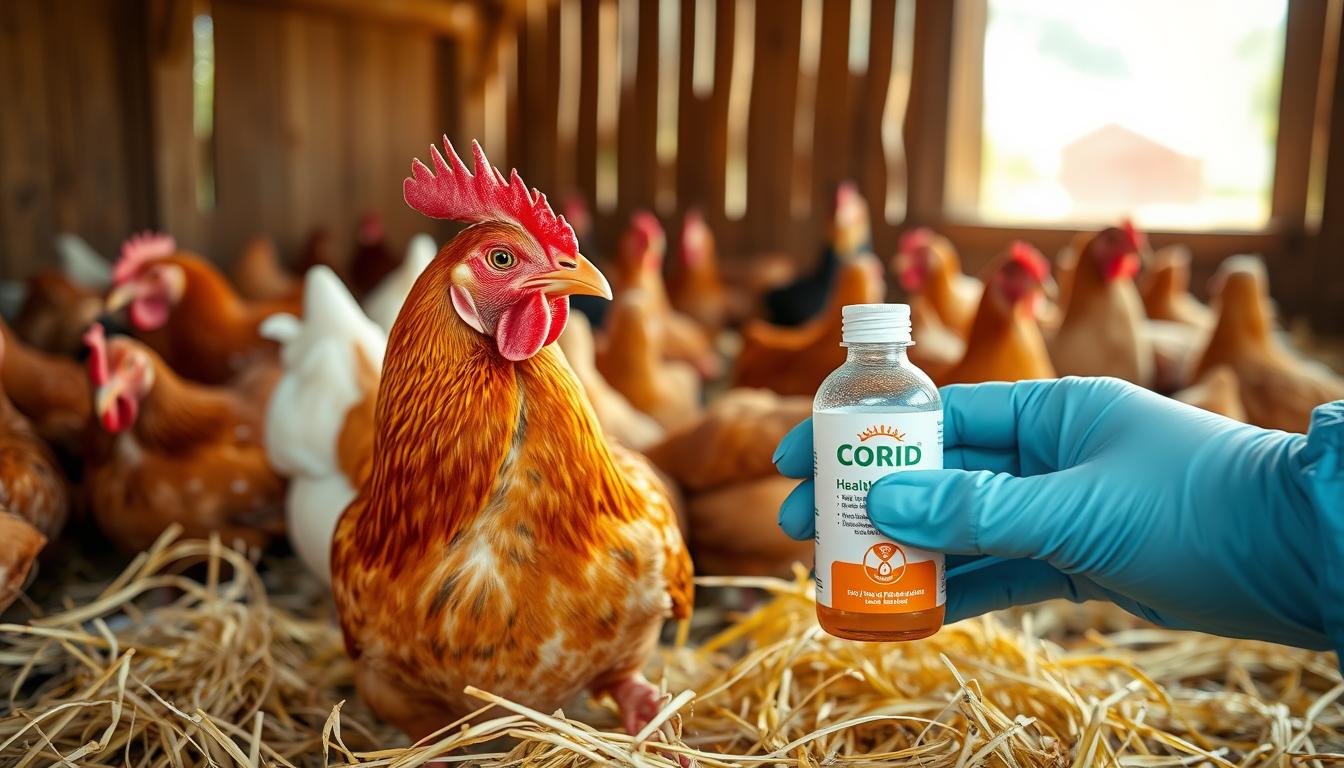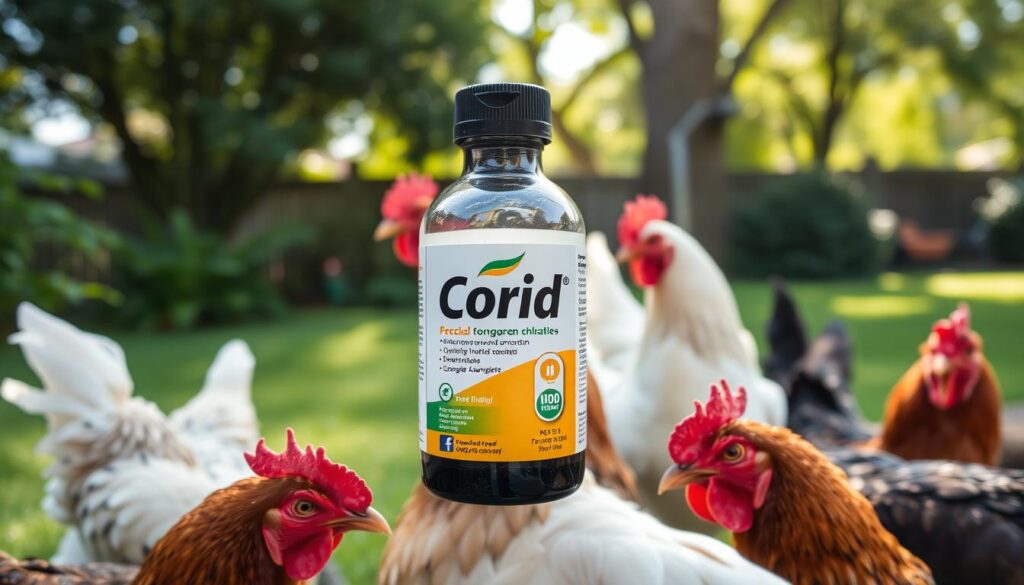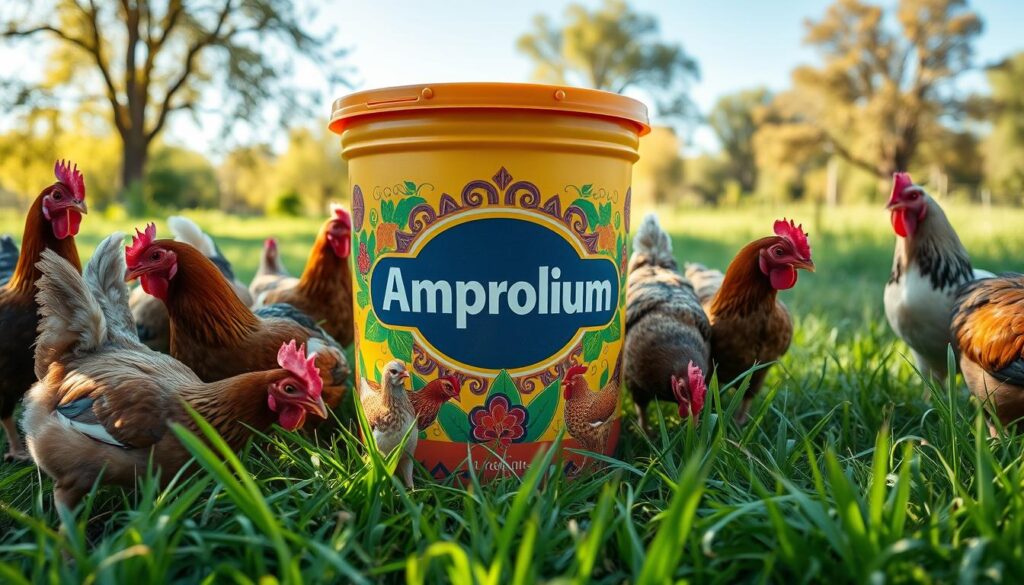Treating Coccidiosis in Chickens with Corid: Complete Treatment Guide

Coccidiosis is a common disease in chickens caused by parasites1. It can be deadly, especially for chicks1. To learn how to protect your flock, check out corid for chickens. Symptoms include diarrhea, blood in droppings, and lethargy1. Using corid is key for treating coccidiosis.
Key Takeaways
- Corid, also known as amprolium, is a reliable coccidiostat that can be used to treat coccidiosis in chickens.
- Coccidiosis is a serious disease that can have a significant impact on the health and productivity of a flock.
- Using corid for chickens is an effective way to treat coccidiosis and prevent its spread.
- Amprolium for poultry is approved by the FDA and has no egg withdrawal period.
- Preventive measures, such as vaccination and maintaining clean living conditions, can help reduce the risk of coccidiosis in your flock.
- Coccidiosis treatment with corid for chickens should be done under the guidance of a veterinarian to ensure the best results.
- Corid dosage for chickens varies depending on the severity of the disease and the age of the birds1.
Understanding Coccidiosis in Poultry
Coccidiosis is a major threat to poultry health. It’s crucial to know its causes, signs, and symptoms to keep your flock healthy2. Coccidiosis is the top killer of brooder chicks, mainly affecting young chickens under six months old because they lack immunity2. Chickens get the disease by eating coccidia, tiny parasites found in the ground or bird feces3.
Symptoms include diarrhea, blood in droppings, lethargy, and loss of appetite4. To stop coccidiosis, keep the environment clean and dry. Using medicated feed and poultry health supplements can also help. These boost the chickens’ immune system and prevent the disease.
Good management is key, like providing enough space and keeping the coop clean4. It’s also important to watch for signs of coccidiosis, such as depression, ruffled feathers, and weight loss4. By understanding coccidiosis and taking preventive steps, you can protect your flock and prevent the disease from spreading.
How Corid for Chickens Works in Fighting Coccidiosis
Corid is a key medication for treating coccidiosis in poultry. The corid dosage for chickens is vital for effective treatment. It kills coccidia parasites, the cause of the disease. It’s important to follow the dosage and administration guidelines for the best results.
The corid dosage for chickens is 2 tsp per gallon of water, changed daily2. This dosage is effective in treating coccidiosis and can show improvement within 24 hours2. Young chickens under six months old are most vulnerable to coccidiosis, as they haven’t developed natural immunity2.
It’s also crucial to maintain good hygiene and a healthy environment for your chickens. Ensure they have enough space, provide proper nutrition, and keep their living area clean and dry. By following these guidelines and using the recommended corid dosage for chickens, you can effectively treat coccidiosis and keep your flock healthy.
For more information on treating coccidiosis in poultry, consult a veterinarian or visit reputable websites like petpawza. They offer valuable resources on animal health and wellness. By preventing and treating coccidiosis, you can help keep your chickens healthy and thriving.
| Corid Dosage | Administration |
|---|---|
| 2 tsp per gallon of water | Changed daily, as the only source of water |
| 1/2 teaspoon per gallon of water | For Corid 20% Soluble Powder |
Identifying the Right Time to Use Corid
Timing is everything when it comes to coccidiosis treatment. As a chicken owner, watch for early signs like changes in droppings or behavior. This is when you should start treatment5. Coccidiosis is a big problem in broiler farms, causing millions of chicken deaths each year in the U.S5.
It’s vital to keep a close eye on your flock’s health. Act fast if you notice any illness signs.
Understanding coccidia’s life cycle is crucial for chicken disease prevention. The infection takes 4-7 days6. Coccidia can live up to a year in the environment6. Keeping your living space clean and dry is key. Use the right drinkers and follow good biosecurity to lower coccidiosis risk. This way, you might avoid needing amprolium for poultry treatment.
Starting treatment early is essential for coccidiosis treatment. The treatment length depends on the outbreak’s severity and the product used, like Corid or toltrazuril5. For more info, check out the-chicken-chick.com, a great resource for backyard chicken keepers.
Prevention is the best approach. Practices like vaccination, medicated feed, and good hygiene can help prevent coccidiosis1. If you must use Corid, make sure to follow the dosage and treatment guidelines. This will keep your chickens healthy and happy.
Proper Corid Dosage for Chickens

Using the right amount of Corid is key when treating coccidiosis in chickens. Corid is a common treatment for this disease. It’s important to use the correct dosage to treat the disease effectively and avoid side effects6. The dosage for Corid depends on the severity of the outbreak, with different amounts for Corid 20% Soluble Powder and Corid Liquid (9.6% Solution)7.
The recommended dosage of Corid 20% Soluble Powder is 1/2 teaspoon per gallon of water. For the drinking water method, add 2 tsp of Corid per gallon of water, changed daily, as the only water source6. Also, Corid has a 3-day egg withdrawal period but no meat withdrawal period, according to the FDA7.
Drinking Water Method
The drinking water method is a common way to give Corid to chickens. This method involves adding the recommended dosage of Corid to the chickens’ drinking water. It’s important to change the water daily to ensure the chickens get the right dosage.
Feed Mixture Applications
Another way to give Corid is through feed mixture applications. This method involves mixing the recommended dosage of Corid with the chickens’ feed. It’s important to follow the recommended dosage and administration guidelines for effective treatment.
| Method | Dosage | Administration |
|---|---|---|
| Drinking Water | 2 tsp per gallon | Changed daily |
| Feed Mixture | 1/2 teaspoon per gallon | Mixed with feed |
Medicated feed for chickens and poultry health supplements can also help prevent and treat coccidiosis. It’s important to follow the recommended dosage and administration guidelines for these products. This ensures effective treatment and prevents side effects7.
Administering Corid Treatment Effectively
When treating coccidiosis in poultry, using Corid correctly is key. You must follow the dosage and administration instructions carefully. Also, keep a close eye on the flock during treatment7. Corid starts working within 24 hours, and the FDA suggests a 3-day meat withdrawal period after treatment in chickens7.
For a successful treatment, chickens need a clean and healthy space. This means removing infected feces, ensuring fresh water, and practicing good hygiene. Probiotics can also help by supporting good bacteria in the chickens’ digestive system5. For more details on coccidiosis in chickens, check out this website.
Important steps for effective Corid treatment include:
* Adhering to the recommended dosage and instructions
* Watching the flock closely during treatment
* Keeping the chickens in a clean, healthy environment
* Using probiotics to aid digestion
By following these steps and being proactive in disease prevention, you can safeguard your flock from coccidiosis. This ensures a healthy and thriving chicken population5.
| Treatment Option | Recommended Dosage | Duration |
|---|---|---|
| Water Treatment | 120-240 mg/liter | 5-7 days |
| Feed Treatment | 125 mg/kg feed | 5-7 days |
Monitoring Your Flock During Treatment
When treating coccidiosis in chickens with corid, it’s crucial to watch your flock closely. Look for changes in behavior and signs of recovery8. Signs include less activity, less eating, and different droppings9. This helps you see if the treatment is working and if you need to change the plan.
Watch for signs like more eating, more energy, and normal droppings10. These signs mean the treatment is working and your flock is getting better. Also, giving poultry health supplements can help keep your flock healthy during and after treatment.
At times, you might need to talk to a vet for more help with coccidiosis treatment9. This is true if you see severe symptoms like bloody diarrhea or if your flock isn’t getting better. Working with a vet and using corid as part of a full treatment plan can keep your flock healthy.
| Recovery Indicators | Description |
|---|---|
| Increased appetite | A sign that the treatment is working and the flock is recovering |
| Improved energy levels | A sign that the flock is returning to normal health |
| Normal droppings | A sign that the coccidiosis treatment is effective |
Prevention Strategies Using Medicated Feed
To stop coccidiosis, medicated feed for chickens is often used. It weakens coccidia in the gut11. Amprolium in Corid is a common way to fight coccidiosis in chickens11. Always follow the dosage and instructions for the feed to work well.
Changing feed from medicated to non-medicated should take 10 days after 6 weeks12. This step helps avoid resistance to the medicine. Also, keeping your place clean and buying chicks from certified hatcheries can help fight coccidiosis11.
Some important steps to prevent coccidiosis include:
- Using medicated feed for chickens as a preventive measure
- Following the recommended dosage and administration instructions
- Implementing biosecurity measures, such as proper sanitation practices
- Buying chicks from NPIP certified hatcheries
By following these steps, you can keep your chickens healthy. It’s important to act early to prevent coccidiosis. Young birds are especially vulnerable and can’t fight off the disease quickly11.
Common Mistakes to Avoid When Using Amprolium

When using amprolium for poultry, it’s key to follow the dosage and instructions carefully. This ensures the treatment works well and prevents chicken disease prevention problems13. A common error is using the wrong corid dosage for chickens, which can make the treatment less effective or even harmful14.
To avoid these mistakes, knowing how to use amprolium for poultry correctly is crucial. This includes the right amount and how long to use it15. A good rule is to mix 2 tsp of Corid with each gallon of water, changing it every day. This should be the only water source15. Also, sticking to the recommended treatment time and keeping the medication in the right place are important to avoid chicken disease prevention issues13.
Some important things to remember when using amprolium include:
- Make sure to measure the medication correctly to avoid dosage errors14
- Stick to the recommended treatment time for best results15
- Keep the medication in a proper storage to keep it effective13
For more tips on keeping your flock healthy, check out petpawza. They have great info on chicken disease prevention and the right corid dosage for chickens14.
Alternative and Supplementary Treatment Options
There are many ways to treat coccidiosis in poultry, besides traditional methods. Poultry health supplements, like probiotics and vitamins, can strengthen the immune system. This helps lessen the disease’s symptoms16.
Some alternative treatments for coccidiosis include:
- Phytogenics, such as herbs and plant extracts
- Coccidiosis vaccines, which can provide long-term benefits by reducing reliance on chemical additives and minimizing antimicrobial resistance17
- Genetic selection programs, which aim to develop poultry strains that are more resistant to coccidiosis
- Nutritional management, which emphasizes balanced diets for poultry16
Always talk to a vet before trying new treatments. This ensures the health of your flock. By working with a vet, you can create a treatment plan that fits your poultry’s needs.
| Treatment Option | Description |
|---|---|
| Probiotics | Help to boost the immune system and reduce the severity of symptoms |
| Vitamins | Essential for maintaining overall health and well-being in poultry |
| Phytogenics | Herbs and plant extracts that can help to reduce the severity of coccidiosis symptoms |
Long-Term Coccidiosis Management Strategies
To prevent coccidiosis and keep your flock healthy, long-term strategies are key. This includes keeping feeders, waterers, and living areas clean and disinfected. Coccidiosis can cost more than €0.04 per bird18, so it’s important to use effective prevention methods.
Preventive steps, like using corid for chickens, can lower coccidiosis risk. Also, remember that warm and humid weather increases the risk. The life cycle of Eimeria includes stages like schizogony, gametogony, and sporogony19.
Some important long-term coccidiosis management strategies are:
- Implementing sanitation protocols
- Using preventive measures, such as corid for chickens
- Considering seasonal factors
By using these strategies and staying up-to-date with research, you can prevent coccidiosis. This will help keep your flock healthy and thriving.
| Strategy | Description |
|---|---|
| Sanitation protocols | Regularly cleaning and disinfecting feeders, waterers, and living areas |
| Preventive measures | Using corid for chickens and other preventive methods |
| Seasonal considerations | Taking into account increased risk during warm and humid weather |
Conclusion: Maintaining a Healthy Flock Through Proper Corid Usage
Using Corid20 correctly is key to treating and stopping coccidiosis in your chickens. Stick to the right dosage and how to give it to keep your flock healthy and productive. Corid is very good at fighting coccidiosis21. It works best when you use it early to boost your chickens’ defenses.
Young chickens, especially those under six months, are most at risk for coccidiosis. Watch for signs like bloody poop or less eating22. Keep your coop clean, use medicated feed, and act fast to stop this disease20.
By using Corid wisely and taking care of your flock, you can keep your chickens healthy and productive. This avoids the problems coccidiosis can bring. Stay up to date, follow the best methods, and work with your vet to make sure your chickens do well.
FAQ
What is Corid and how does it work in treating coccidiosis in chickens?
What are the signs and symptoms of coccidiosis in chickens?
When should I start using Corid to treat coccidiosis in my flock?
How much Corid should I give to my chickens, and how should I administer it?
What should I do to prevent coccidiosis in my flock?
Are there any alternative or supplementary treatment options for coccidiosis besides Corid?
Source Links
- https://the-chicken-chick.com/coccidiosis-what-backyard-chicken/ – Coccidiosis: What Backyard Chicken Keepers Should Know
- https://www.freedomrangerhatchery.com/blog/coccidiosis-your-chickens-what-you-need-to-know/ – Coccidiosis & Your Chickens – What You Need to Know | Freedom Ranger Hatcheries
- https://grubblyfarms.com/blogs/the-flyer/coccidiosis-in-chickens-symptoms-treatment-more?srsltid=AfmBOoqVZKUETcnKqvxUD-gBIJgxGieT4hgn0XWkvEsW3xkOYyBTmjR- – Coccidiosis in Chickens: Symptoms, Treatment, & More
- https://extension.psu.edu/managing-chicken-coccidiosis-in-small-flocks-during-summer – Managing Chicken Coccidiosis in Small Flocks During Summer
- https://www.gardenfarmthrive.com/blog/coccidiosis-in-chickens – Coccidiosis in Chickens: Preventing, Identifying and Treatin
- https://www.poultryshowcentral.com/Coccidiosis.html – Coccidiosis
- https://www.chickenfans.com/corid-for-chickens/ – Corid for Chickens: Dosage & Treatment of Coccidiosis | Chicken Fans
- https://grubblyfarms.com/blogs/the-flyer/coccidiosis-in-chickens-symptoms-treatment-more?srsltid=AfmBOopJO0F3I4S7QpzoqS0eAyXV0gsjaGpITGs7MKVwTjr7dsv0tshd – Coccidiosis in Chickens: Symptoms, Treatment, & More
- https://thefarmerslamp.com/coccidiosis-in-poultry/ – Coccidiosis In Backyard Poultry: How To Recognize, Treat, & Prevent
- https://chickenexperts.com/blogs/chickens/coccidiosis-in-chickens-prevention-diagnosis-and-treatment-made-easy – Coccidiosis in Chickens – 💉Prevention, Diagnosis and Treatment Made Easy!
- https://backyardpoultry.iamcountryside.com/feed-health/preventing-coccidiosis-in-chickens/ – Preventing Coccidiosis In Chickens – Backyard Poultry
- https://cvm.msu.edu/vdl/client-education/newsletter/spring-2018/preventing-six-common-mistakes-in-small-poultry-flocks – Preventing Six Common Mistakes in Small Poultry Flocks
- https://afarmgirlinthemaking.com/how-to-beat-coccidiosis-and-keep-your-flock-healthy/ – How to Beat Coccidiosis | Keep a Healthy Flock
- https://homesteadhow-to.com/how-to-manage-and-treat-coccidiosis-in-chickens/ – How to Manage and Treat Coccidiosis in Chickens
- https://backyardpoultry.iamcountryside.com/feed-health/busting-7-myths-about-medicated-chick-starters/ – Myths About Medicated Chick Starters – Backyard Poultry
- https://www.feedstrategy.com/blogs/animal-nutrition-views/blog/15636543/6-modern-alternatives-to-coccidiostats-for-poultry – 6 modern alternatives to coccidiostats for poultry
- https://pmc.ncbi.nlm.nih.gov/articles/PMC4346696/ – Control of Avian Coccidiosis: Future and Present Natural Alternatives
- https://pmc.ncbi.nlm.nih.gov/articles/PMC9497773/ – Coccidiostats and Poultry: A Comprehensive Review and Current Legislation
- https://pmc.ncbi.nlm.nih.gov/articles/PMC8724208/ – Chicken Coccidiosis: From the Parasite Lifecycle to Control of the Disease
- https://www.backyardchickens.com/articles/coccidiosis-treatment-signs-of-infection-cause-good-herbs-for-the-immune-system-prevention.78683/ – coccidiosis treatment, signs of infection, cause, Good herbs for the immune system, & prevention
- https://grubblyfarms.com/blogs/the-flyer/coccidiosis-in-chickens-symptoms-treatment-more?srsltid=AfmBOoqvII9uOwMLYAtxHFA_WoVtTPzok54ZWJiJCMockkfENKj_PMo6 – Coccidiosis in Chickens: Symptoms, Treatment, & More
- https://www.backyardchickencoops.com.au/blogs/learning-centre/coccidiosis-in-chickens-prevention-symptoms-and-treatment-tips – Coccidiosis in Chickens – Prevention, Symptoms and Treatment Tips


